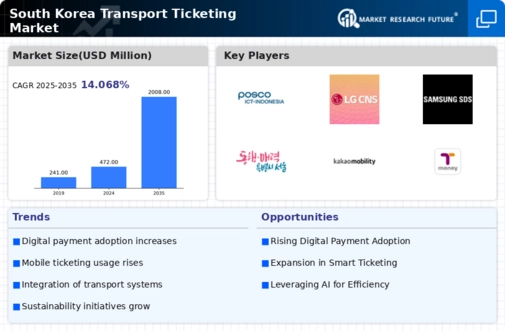Rapid technological advancements and an increasing demand for efficient and user-friendly ticketing systems characterize the South Korea Transport Ticketing Market. With the growth of urbanization and public transport usage, the need for sophisticated ticketing solutions has surged. This has led various companies to innovate and enhance their offerings, resulting in a competitive environment where technology-driven solutions are prioritized. The market includes traditional methods of fare collection transitioning into automated and digital platforms, further indicating a shift in consumer behavior towards electronic ticketing options.
As companies strategize to enhance customer experience and streamline operations, understanding competitive insights becomes crucial for stakeholders aiming to exploit market opportunities.Posco ICT, known for its advanced technological prowess, has established a significant presence in the South Korean Transport Ticketing Market through its integrated solutions that enhance transit operations.
The company's strength lies in its extensive expertise in information and communication technology, which it leverages to offer innovative ticketing systems that improve the efficiency and reliability of transport networks. Posco ICT's ability to integrate smart technologies with existing transport infrastructures positions it as a leader in providing seamless connectivity and user experiences in the ticketing process. The company's strong partnerships with local government agencies and transport authorities further augment its market reach, allowing it to play a crucial role in shaping future transport ticketing trends in South Korea.
Korea Smart Card, a pivotal player in the South Korean Transport Ticketing Market, specializes in contactless smart card technology widely used across various transit systems. The company offers key products and services that include SIM card-based transportation cards, which enhance user convenience and provide efficient fare collection processes. Korea Smart Card boasts a strong market presence, having established a brand recognized for reliability and innovation. The company’s strengths include its ability to quickly adapt to industry changes and its commitment to delivering user-centric solutions.
Strategic mergers and acquisitions have enabled Korea Smart Card to expand its service portfolio, integrating advanced technologies that cater to the evolving demands of public transportation consumers in South Korea. Additionally, its focus on research and development allows for continuous improvement in ticketing solutions, ensuring that the company remains competitive within the dynamic South Korean market.















